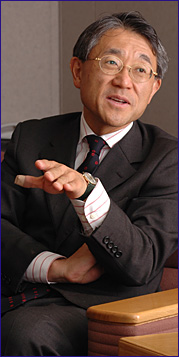

The government, intending to take advantage of this phenomena, released a report called The Japan Brand Strategy: Making the Soft Power Industries the Engine of Growth in March 2009 and revealed national guidelines to accommodate the phenomena. Fundamentally, it is an optimistic economic growth scenario that advocates the utilization and promotion of “Cool Japan.” The report uses a term from political science, “soft power.” (In contrast to “hard power“, such as political, economic and military power possessed by the state that can be used coercively against other nations, soft power can strengthen the trust and voice of nations in the international community by obtaining sympathy for and assent to that nation’s culture, and political values and ideals and the attractiveness of its policies. The soft power eventually has other nations voluntarily share the same things the nation wants.) The report uses the word “soft power” rather facilely, but the word implies more important things beyond intention of the report.
As long as we positively tie “Japanese-style things” to the national interest and the nation itself, and speak about it outwardly, and aggressively sell them overseas as the “Japanese brand,” the issue of nationalism becomes unavoidable. This is because shared identity as the aggregate of individual’s national identity is nothing more than nationalism itself. The national identity is self-definition by an individual which entails the self-awareness of being a “Japanese national”, and the identity is fostered by the nation-state system through these “Brand Japan” activities, Therefore, it is obvious that we cannot deny that the identity is deeply related to culture, which is a system to govern the behavior of human beings, so the boosting of “Cool Japan” results in the problem of cultural nationalism.
I think many people believe that the further globalization progresses, the more unitary the world becomes. Namely globalization brings an end to the era of nationalism and the arrival of a global era. The move toward globalization is certainly irreversible. In reality, however, globalization is also “throwing people out of their local communities and into a global world while simultaneously making autonomous decentralization possible, and accepting diversity.” In fact, globalization is not the simple movement of unification toward the formation of common market and society but more complicated movement. It is the situation known as the global paradox in which both enhancing local autonomy and establishing local centers of power and activities are required. In other words, as globalization advances, local community reaffirms and strengthens its internal homogeneity through its awareness of the existence of external heterogeneity. In short, it is necessary to understand the structure of the process where the more globalized society becomes, the stronger awareness of uniqueness (difference) becomes simultaneously,
It is natural that, in order to respect other cultures in a globalized and diversified world, local communities avoid mutual friction as much as possible. In other words, the communities segregate themselves from each other. This tells that there is no choice but to affirm existence of collective national identity, i.e., nationalism structurally. As pointed out by social anthropologist Benedict Anderson, globalism is hand-in-hand with nationalism, and has in fact urged generation and development of nationalism. In the irreversible globalization, globalism and nationalism coexists side-by-side like twins that dislike each other. In the context of the global paradox, it is not a contradiction but appropriate and reasonable even though having an argument about nationalism in midst of globalization may sound like a contradiction at first glance.
Certainly, nationalism entails the danger of changing to blind chauvinism. But it is no doubt that we cannot pull realistic solutions to curtail the danger out of moralistic “we should” approach, which is thought to be a desirable internationalist approach in Japan. Proponents of the approach, pretending to take an objective position, deny nationalism on the grounds that the possibilities for commonality and mutual understanding among different cultures should be emphasized first of all. In order to find realistic solutions, what we need now, is that we first presume cultural nationalism in the globalizing society, or more accurately, something we should call “brand nationalism,” a form of cultural nationalism driven by market dynamism, exists and we are not able to eliminate it, and then we should consider how to manage the latent rigidity and exclusiveness that nationalism possesses.
I think, in order to pursue the approach, that concept of “koto”, the concept which is unique to the Japanese language, may provide a clue to managing the issue of brand nationalism. The fifth edition of the Shin Meikai Kokugo Jiten Japanese language dictionary defines “koto” as follows: “Koto refers to things experienced or imagined by human beings that are thought to change with the passage of time. Also, the process of this change.” The second edition of the Daijirin Japanese language dictionary explains “koto” while comparing it to the similar concept of “mono” as follows: “Whereas “mono” is understood to be a material object that remains unchanged regardless of passage of time,” koto” is understood to be a phenomenon that occurs and disappears. In philosophical terms, “mono” indicates a subjective entity whereas “koto” indicates a predicative existence mode, and the latter term includes temporal momentum.” In other words, “mono” is a stable and objective like noun which eliminates subjectivity and does not include the notion of temporal variation that differentiates the subject and the object. On the other hand, “koto” is a predicate (verb) concept, an unstable event that progresses over time (experienced by the subject with the object) and conjugates the object and the subject without separating them. (or eliminating subjectivity). The expression “utsuroi (transience)” that the Japanese people like, represents this concept. As in the definition, “mono” is extremely rigid, and oriented toward purity. On the other hand, “koto” is flexible and allows for ambiguity.
I believe that once we have understood the difference in these two terms, thorough realization of the differences between the quest for “what is a Japanese person as mono” and the practice of “being a Japanese person as koto ” could contribute to finding realistic solutions to the problems we will face related to the boosting of brand nationalism.
Profile
Professor Yasushi Ogasawara, School of Global Japanese Studies, specializing in Business Culture in Contemporary Japan, Intellectual Property Management from a Cultural PerspectiveBorn in Kamakura in 1957. Graduated from the University of Tokyo Faculty of Letters, and obtained a master’s degree in international political economy in the Graduate School of Social Sciences, University of Chicago, and a master’s degree in business administration in the Graduate School of Business University of Chicago. After working for McKinsey & Company, joined the corporate headquarters of Cargill in Minneapolis, the United States. After working in the United States and then for Cargill overseas operations in the Netherlands and the United Kingdom, joined NTT DATA Institute of Management Consulting, Inc. After serving as a partner at this company, was appointed to the present position in April 2009.









